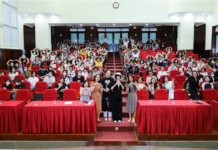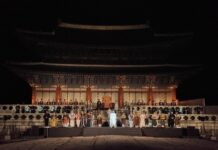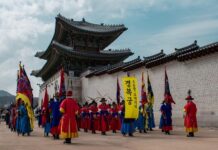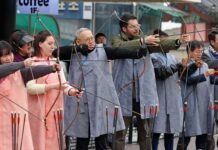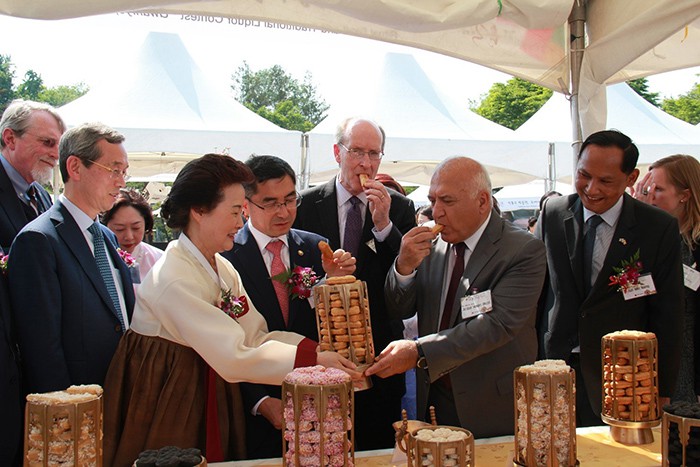
Korean Food Foundation President Yoon Sook-ja offers a jungbakgye, a traditional cookie prepared for royal ceremonies, to Turkish Ambassador to Korea Arslan Hakan Okcal, at the Namsangol Hanok Village in Seoul where the 10th Korean Traditional Liquor & Food Festival took place on May 18.
By Hur SomEe and Yoon Sojung
Photos: Hur SomEe
May 18, 2017 | Seoul
“The culture and wisdom of our ancestors is melted into our traditional liquors and foods,” said Korean Food Foundation President Yoon Sook-ja, emphasizing the meaning of seasonal ingredients and traditional ceremonies.
Yoon was explaining traditional Korean cuisine at the Namsangol Hanok Village in Jung-gu District, Seoul, where the 10th Korean Traditional Liquor and Food Festival took place on May 18.
“We can see the history and wisdom of our ancestors, who considered nutrition in an agrarian society to be very important, when we look closely at traditional Korean cuisine,” she said.
“An example of that can be seen in the seasonal food and liquor enjoyed on Dano, a traditional holiday that falls on the fifth day of the fifth lunar month,” she said.
“On Dano, people would pick mugwort leaves to make surichwi rice cake (수리취떡) and brew aeju (애주, 艾酒). They also brewed songsunju (송순주, 松筍酒) with pine leaves and changpoju (창포주, 菖蒲酒) with sweet iris leaves. These seasonal foods helped people to enjoy both taste and nutrition.”
“Our ancestors never prepared their meals or drinks carelessly,” she said.
“Considering their devotion to brewing liquors with a variety of ingredients, malts, medicinal herbs, jujube and even ginseng, it was a real art. We’ve been introducing traditional liquors and foods to people for almost 10 years now,” said Yoon.

Traditional snacks and liquors are on display along with other seasonal foods enjoyed on Dano as part of the seasonal 10th Korean Traditional Liquor & Food Festival, at the Namsangol Hanok Village in Seoul on May 18.
Under the theme “Excitement of Korean, Song of Liquor in the Art of Drinking,” the festival focused on 200 traditional foods for seasonal and ceremonial occasions, such as weddings, coming of age ceremonies, funerals and ancestral rites, all accompanied with traditionally brewed liquors. Visitors to the festival were able to enjoy a sampling of non-alcoholic beverages and also of makgeoli traditional rice beer cocktails developed by a traditional liquor sommelier called a juyesa (주예사, 酒藝士).
Among the visitors were Suzuki Mai from Japan and Meruyert Atambekova from Kazakhstan. Both said that, “We love makgeoli rice beer so much. This is the first time for us to make traditional liquor, and it’s very interesting to learn,” they said with a smile.
sehp91@korea.kr

Suzuki Mai (left) from Japan and Meruyert Atambekova from Kazakhstan participate in the traditional Korean liquor experience program at the 10th Korean Traditional Liquor & Food Festival, at the Namsangol Hanok Village in Seoul on May 18.
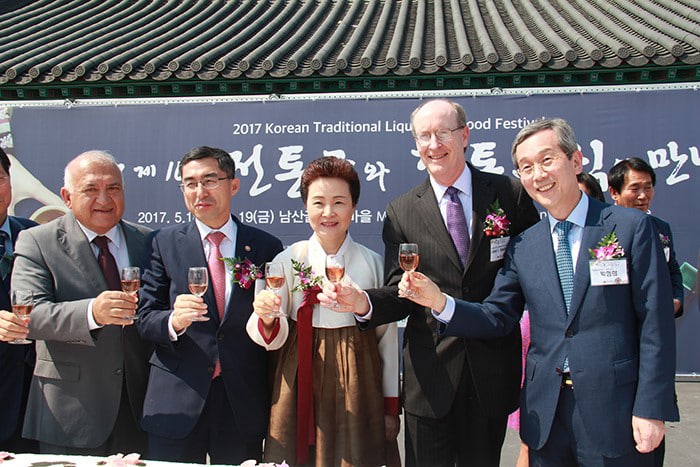
Turkish Ambassador to Korea Arslan Hakan Okçal (left), Edwin C. Sagurton (fourth from left), the minister-counselor for political affairs at the U.S. Embassy in Korea, and other dignitaries attend the opening ceremony of the 10th Korean Traditional Liquor & Food Festival, at the Namsangol Hanok Village in Seoul on May 18. Each diplomat holds a glass of ogamju, (오감주, 五感酒), a type of traditional Korean liquor made from five medicinal ingredients.


